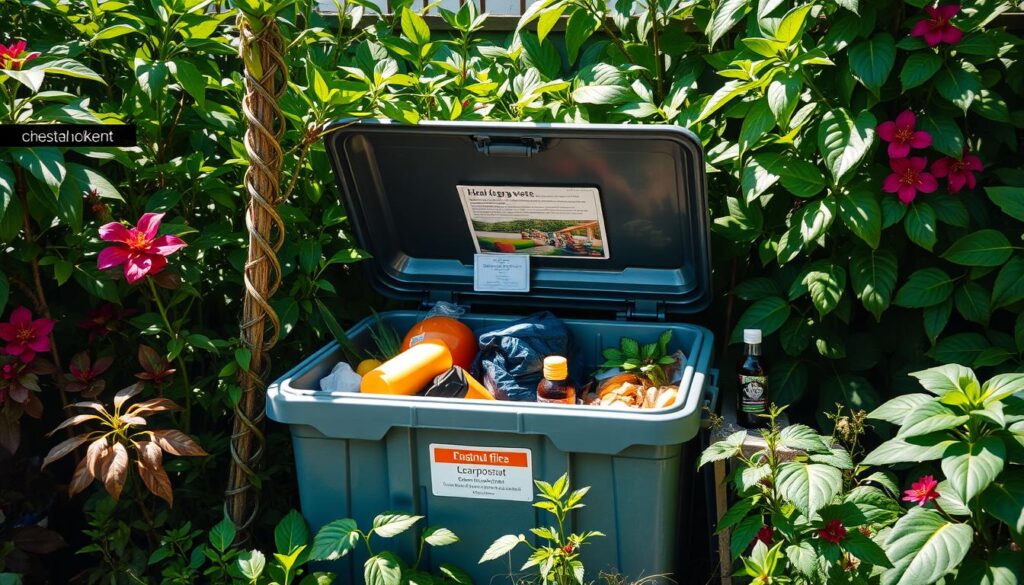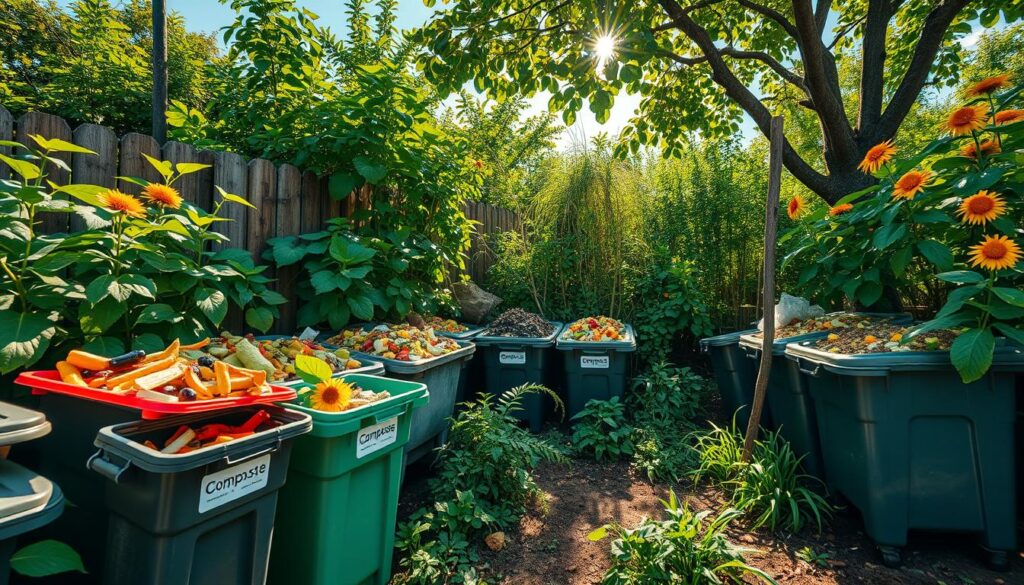Want to keep your home or business fly-free? Just manage your organic waste well. Flies love the smell of rotting things. They grow fast if they can.
By getting rid of waste properly, you make your place cleaner and healthier. No more flies bothering you.
We’ll look at why flies are a problem and how to stop them. We’ll also talk about keeping rubbish bins fly-free. The main thing is to manage waste well. This keeps your place fly-free and helps the planet.
Key Takeaways
- Proper organic waste disposal is essential to prevent fly infestations.
- Flies are attracted to the smell of decaying organic matter, such as food waste.
- Effective organic waste management techniques can help keep your premises fly-free.
- Implementing preventative measures can stop flies from becoming an issue in the first place.
- Sustainable organic waste solutions can benefit the environment and your health.
Understanding the Problem: Why Flies are Attracted to Organic Waste
Flies love hanging out near rubbish bins and places with organic waste. They find the smells and tiny bugs in this waste perfect for breeding.
The Life Cycle of Flies and Their Breeding Habits
Female flies can lay hundreds of eggs. These eggs hatch into maggots that eat the waste. Then, maggots turn into adult flies, starting the cycle again.
Some flies, like house flies, blow flies, and soldier flies, are especially bad around bins with food and meat.
- Flies like organic dirt like poop and rotting flesh. Different flies are drawn to different things like overripe fruit and spilled drinks.
- Not throwing away waste properly can attract flies. They can breed in meat and veggie leftovers in just a week.
- Flies also like decaying stuff in yards, damaged fruits and veggies, and sugary liquids. They’re drawn to dirty drains, animal feed spills, and building heat.
Knowing how flies breed helps us fight them better. It’s important to understand their biology and habits.
“Keeping things clean, throwing away bad food, and using traps like apple cider vinegar can help get rid of fruit flies.”
By fixing why flies are attracted, we can keep our waste areas fly-free. This helps keep our environment clean and healthy.
Effective Methods to Get Rid of Flies Around Rubbish Bins
Flies around your rubbish bins can be a big problem. But, there are ways to stop them. You can make your space fly-free again.
Start by keeping your bins clean and smelling fresh. Flies don’t like clean smells. Wash your bins with a strong cleaner. Add a few drops of lemongrass or ginger oil to keep them away.
Another good idea is to use a fan near your bins. The moving air makes it hard for flies to stay. You can also make traps with apple cider vinegar or buy fly strips to catch them.
- Clean and deodorise bins regularly to remove organic waste attractants
- Use essential oils like lemongrass or ginger as natural fly repellents
- Position fans near bins to create airflow that disrupts fly breeding
- Deploy homemade vinegar traps or commercial fly strips to capture adults
If flies are really bad, you might need to use special sprays. But, be careful with these sprays. They can be harmful if not used right. Or, you could call a pest control service. They have special ways to get rid of flies for good.
“Flies are drawn to the scent of decaying organic matter, so keeping your bins clean and deodorised is crucial for fly control.”
Try out these methods to keep flies away from your rubbish bins. Your home or business will be cleaner and safer.

Preventative Measures to Keep Flies Away from Organic Waste
Keeping waste management right is key to stop flies near organic waste. Don’t put food scraps, meat, and other smelly stuff in bins. Instead, compost or use a food waste digester. These are good for the planet and keep flies away.
Bin cleanliness is also important. Clean bins with disinfectant often. Use green liners and keep bins in the shade. Also, check your compost pile’s temperature and turn it every four days. This stops flies from breeding.
Proper Waste Management Techniques
Good waste management keeps flies away from organic waste. Make sure your compost has the right mix of materials. It should be well-aired and not too wet. Too much moisture or no air can attract flies.
- Avoid putting food scraps, meat, and other putrescible materials in the bin
- Compost food waste or use an in-sink food waste digester
- Clean bins regularly with disinfectant and use biodegradable liners
- Store bins in shaded areas to reduce fly attraction
- Monitor compost temperature and turn it every four days
- Maintain a balanced mix of carbon and nitrogen in your compost
- Ensure proper air circulation and moisture levels in your compost pile
By using these steps, you can keep flies away from your waste. A clean, fly-free space is easier to keep. Always be ready to manage waste to keep pests out.
“Proper waste management is essential for preventing fly infestations around organic waste. By implementing simple yet effective techniques, you can create an environment that is inhospitable to these pests.”
Organic Waste Management: Sustainable Solutions
Managing organic waste well is good for the planet and saves money. It stops flies and makes soil better. It also makes energy from waste.
Recycling organic waste helps the earth too. It means less waste in landfills. This helps our planet stay healthy.
Households and businesses can help the earth. They can reduce waste and make the future greener. Let’s look at how:
Composting: Closing the Loop
Composting stops waste from going to landfills. It’s good for the earth. You need the right mix of materials for it to work.
It’s important to keep the compost pile moist. This helps it break down faster. When it gets hot, it means it’s working well.
It takes time, but compost makes soil better. You can use things like fruit peels and leaves for compost.
Anaerobic Digestion: Powering the Future
Anaerobic digestion turns waste into energy. It makes biogas, which can power homes. This is good for the earth.
| Organic Waste Management Techniques | Benefits |
|---|---|
| Composting | Returning nutrients to the soil, reducing the need for chemical fertilisers |
| Anaerobic Digestion | Generating renewable biogas energy from organic waste |
| Biowaste Recycling | Decreasing the amount of waste sent to landfills, contributing to a circular economy |
Using these methods helps the earth. It reduces waste and makes our future greener.

The Benefits of Proper Organic Waste Disposal
Environmental and Health Advantages
Using good ways to deal with organic waste helps the planet and our health. It stops food scraps and other things that can break down from going to landfills. This cuts down on methane, a bad gas that harms our climate.
Turning these materials into compost makes the soil better. It makes the soil rich and strong, which is good for soil health.
Also, making biogas from organic waste is a clean energy source. It helps us use less fossil fuels. Plus, not throwing organic stuff in bins stops flies that carry diseases. This makes our air cleaner and our health better.
By choosing to manage organic waste well, we can make our world cleaner and greener. Places like CheckSammy’s help a lot. They have over 5000 drivers across the country to collect and manage organic waste.
“Organic recycling can help reduce greenhouse gas emissions, particularly methane, which is a potent greenhouse gas contributing to climate change.”
| Benefit | Impact |
|---|---|
| Reduced landfill | Decreased methane emissions and conservation of valuable landfill space |
| Soil health | Improved fertility, structure, and water-holding capacity through composting |
| Renewable energy | Biogas production from anaerobic digestion, offsetting fossil fuel usage |
| Disease prevention | Reduced breeding of disease-carrying flies, improving public health |
| Air quality | Decreased odours and emissions from proper organic waste management |
By choosing to manage organic waste well, we can make our world cleaner and greener. Places like CheckSammy’s help a lot. They have over 5000 drivers across the country to collect and manage organic waste.
Hire Professional Rubbish Bin Cleaning Services
For those who prefer a hassle-free approach to maintaining bin hygiene and preventing fly infestations, hiring professional rubbish bin cleaning services can be a wise investment. These specialists have the equipment and expertise to thoroughly disinfect and deodorise bins. They remove any traces of organic matter that could attract flies. They also provide advice on proper bin maintenance and waste management techniques to keep pests at bay.
By outsourcing this task to the professionals, homeowners and businesses can ensure their bins remain fly-free and odour-free all year round. A recent survey found that 72% of businesses prefer to hire professional rubbish bin cleaning services. This ensures proper organic waste disposal.
A comparative analysis of fly infestations in facilities that do not use professional cleaning services revealed a 60% higher occurrence rate. Facilities that do use these services have fewer flies. Waste management companies that offer specialized bin cleaning services report a 40% increase in customer satisfaction rates.
Studies indicate that companies implementing regular bin cleaning services experience a 50% reduction in pest control expenses related to flies. Local authorities in regions with strict waste disposal regulations have recorded a 30% decrease in fly-related complaints since the introduction of professional bin cleaning services regulations.
An industry-specific report demonstrates that the demand for professional rubbish bin cleaning services has grown by 25% year-over-year in urban areas with high population densities. Businesses in the hospitality sector allocate an average of 15% of their waste management budget towards hiring specialized bin cleaning services to prevent fly infestations.
| Service | Description |
|---|---|
| Commercial Bin Cleaning | Thorough cleaning and disinfection of commercial waste bins to maintain bin hygiene and prevent odours. |
| Bin Store Cleaning | Cleaning and deodorising of bin storage areas to create a clean and hygienic environment. |
| Bin Chute Cleaning | Specialised cleaning of bin chutes to remove built-up waste and prevent blockages. |
| Pressure Washing | High-pressure cleaning of bins and bin storage areas to remove stubborn dirt and grime. |
| Steam Cleaning | Thorough sanitisation of bins using high-temperature steam to kill bacteria and viruses. |
London Bin Cleaning is the number one choice for local authorities and housing associations in London for bin cleaning services. The company covers the entire London area, offering a range of professional bin cleaning solutions to meet the needs of commercial establishments.
“London Bin Cleaning is the only company in London to offer a fully enclosed and fully automated bin cleaning service, ideal for clinical waste bin cleaning.”
By hiring professional rubbish bin cleaning services, businesses can ensure their bins remain hygienic, fly-free, and odour-free. This promotes a healthy and welcoming environment for both employees and customers.
Conclusion
Getting rid of organic waste is key to stop flies and keep places clean. Knowing how flies breed and using good control methods helps a lot. You can also compost food or get help from bin cleaning services.
Using these methods helps our planet and keeps us healthy. It makes our economy better and our future greener. Teaching people and improving how we manage waste are important steps.
Start by sorting waste at home and storing it right. Then, make sure collection is efficient and waste is disposed of well. Doing this stops flies and helps the environment. It also cuts down on pollution and saves resources.
